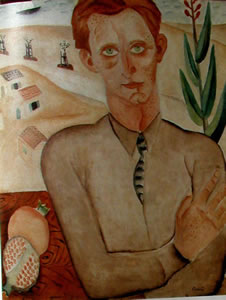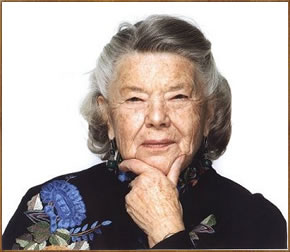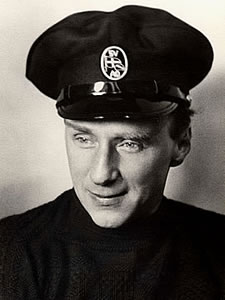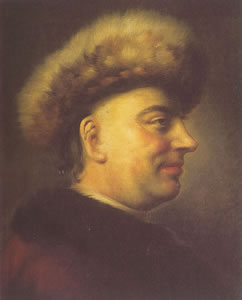|
De Israëlische Hebreeuwse en Jiddische dichter en politicus Uri Zvi Greenberg werd geboren op 22 september 1896 in Bialikamin, Lviv, in Galicië, destijds behorend tot Oostenrijk-Hongarije. Greenberg stamde uit een beroemde chassidische familie. Van 1915 tot 1917 was hij een soldaat in het Oostenrijks-Hongaarse leger. Toen deserteerde hij. Terug in Lviv (Dt: Lemberg) in 1918 was hij getuige van de pogroms, iets wat hem diep beïnvloed heeft. Hij woonde daarna in Berlijn en Warschau, waar hij begon te schrijven in het Jiddisch en Hebreeuws. In 1924 emigreerde Greenberg naar het Britse mandaatgebied Palestina. Daar werd hij enthousiast over de kibboetsbeweging en schreef hij alleen nog in het Hebreeuws, eerst voor het tijdschrift Davar, een belangrijk orgaan van de zionistische linkse arbeidersbeweging. Na het bloedbad in Hebron in 1929 werd Greenberg steeds militanter. Hij bekritiseerde de passiviteit van de Britse autoriteiten ten aanzien van het geweld in het Palestijnse Mandaatgebied. Hij werd lid van de rechtse Irgun en de ondergrondse organisatie Lehi, een afsplitsing van de Irgun. Sinds 1930 was hij een fervent voorstander van de revisionistische vleugel van het zionisme, en vertegenwoordigde de revisionistische zionistische beweging tijdens verschillende bijeenkomsten in Polen. Bij het uitbreken van de Tweede Wereldoorlog was hij toevallig in Polen, maar hij was in staat om terug naar Palestina te gaan. De rest van zijn familie kwam tijdens de Holocaust om het leven. Na de stichting van Israël in 1948 tradGreenbergtoe tot de Herut Partij van Menachem Begin en in 1949 werd hij in de Knesset gekozen.xml:namespace prefix = o ns = "urn:schemas-microsoft-com:office:office" />
A Land Lost
Trusting their folly though their pilot is out
Blind to what's written on the walls all about
Written by a hand moved by G-d's ire
Hubris of traitors that to lead aspire.
My people obey them like sheep in human attire
Multitudes drifting to their funeral pyre
Their herders know not, but I know what they do
Pray G-d, a miracle, save, their doom undo
Lord, bare are all rocks and on the heather no dew.
For most are in the pit and the rest at its portal
I know, for I totter with my feet on its edge
dragging myself as the most wretched of prophets
of land lost by the guilt of its leaders.
The Great Sad One
The Almighty has dealt bitterly with me
That I did not believe him until my punishment,
Till he welled up in my tears, from the midst of my wounds.
And behold he is very lonely,
And he also lacks someone to confess to,
In whose arms he might sob his unbearable misery,
And this G-d walks about, without a body, without blood,
And his grief is double the grief of flesh,
Flesh that can warm another body of a third,
That can sit and smoke a cigarette
And drink coffee and wine,
And sleep and dream until the sun
For him it is impossible for he is G-d.

Uri Zvi Greenberg (22 september 1896 8 mei 1981)
De Britse schrijfster Rosamunde Pilcher werd op 22 september 1924 geboren in Lelant, Cornwall, Groot-Brittannië. Zie ook mijn blog van 22 september 2009.
Uit: September
Death is nothing at all. It does not count. I have only slipped away into the next room. Nothing has happened. Everything remains exactly as it was. I am I, and you are you, and the old life that we lived so fondly together is untouched, unchanged. Whatever we were to each other, that we are still. Call me by my old familiar name. Speak of me in the easy way which you always used. Put no difference into your tone. Wear no forced air of solemnity of sorrow. Laugh as we always laughed at the jokes that we enjoyed together. Play, smile, think of me, pray for me. Let my name be ever the household word that it always was. Let it be spoken without an effort, without the ghost of a shadow upon it. Life means all that it ever meant. It is the same as it ever was. There is absolute and unbroken continuity. What is this death but a negligible accident? Why should I be out of mind because I am out of sight? I am but waiting for you, for an interval, somewhere very near, just around the corner. All is well.

Rosamunde Pilcher (Lelant, 22 september 1924)
De Duitse dichter en schrijver Hans Leip werd geboren op 22 september 1893 in Hamburg. Zie ook mijn blog van 22 september 2008.
Uit: Hamburg, Juli 1943
So sah mans in Blankenese vom Bismarckstein aus, als die Bomber davonwaren; ich stand und zeichnete dies Blatt, und die brennende Stadt leuchtete über viele Kilometer hin genug, so daß ichs hinkriegen konnte mit dem schwarzen Kreidestift. Es war der dritte große Angriff gewesen. Den Nachmittag war ich vom Bodensee nach Hause gelangt. Am anderen Morgen fuhr ich mit Baurat Müller in die Stadt (dem Vater Gesas, der Freundin meiner ältesten Tochter Mule). An manchen Stellen brannte es noch. Ich sah einen verstörten Mann im Schlafanzug umherirren, einen Band Gedichte in der Hand. Er beschäftigte meine Phantasie so sehr, daß ich ihn Herr Pambel nannte und sein Schicksal beschrieb.
Hab und Gut häufte sich auf den Straßen, als sollte eine Auktion in freier Luft stattfinden. Der große deutsche Ausverkauf hatte begonnen. In mir sagten sich die ersten Zeilen des Liedes im Schutt her. Ich zeichnete dabei, was ich sah, obwohl es verboten war ...

Hans Leip (22 september 1893 6 juni 1983)
Leip in 1936
De Duitse dichter Barthold Heinrich Brockes werd geboren in Hamburg op 22 september 1680. Brockes studeerde rechtsgeleerdheid in Halle en maakte reizen naar Italië, Frankrijk en Nederland. Hij vestigde zich vanaf 1704 in Hamburg. In 1720 werd hij benoemd als lid van de Hamburgse gemeenteraad, en bekleedde diverse functies in het bestuur van de stad. Hij was 6 jaar (van 1735 tot 1741) magistraat in Ritzebüttel. Gedichten van Brockes werden in 9 banden gepubliceerd onder de titel Irdisches Vergnügen in Gott (1721-1748). Hij vertaalde Giambattista Marini's La Strage degli innocenti (1715), Alexander Pope's Essay on Man (1740) en James Thomson's Seasons (1745). Het libretto Der für die Sünden der Welt gemarterte und sterbende Jesus (1712) was één der eerste passie-oratoria, een vrije en poëtische meditatie op het passieverhaal zonder gebruik van een evangelisch karakter. Het was een populair werk, en werd op muziek gezet door onder andere Reinhard Keiser, Georg Philipp Telemann, Georg Friedrich Händel enJohann Mattheson.
Falschheit
Es herrschet in der Welt die Falschheit aller Orten;
die Wahrheit ist verbannt, die Redlichkeit verjagt;
die Freunde dieser Zeit sind Freunde bloß in Worten:
der Allerehrlichste tut anders, als er sagt.
Der, so dich herzt und küsst, wird dich ohnfehlbar fällen,
So bald er glaubt, dein Fall könn' ihm erspriesslich sein.
Kein Mensch ist, was er scheint: man weiss sich zu verstellen,
Nie stimmt mit dem Gemüt das Ansehn überein.
Doch dieses alles muß man nicht von Weibern meinen,
Weil ihrer keine fasst uns je betrogen hat,
Indem sie insgemein von aussen boshaft scheinen:
Und wenn man's untersucht, so sind sie's in der Tat.

Barthold Heinrich Brockes (22 september 1680 - 16 januari 1747)
Portret door Dominicus van der Smissen
|



